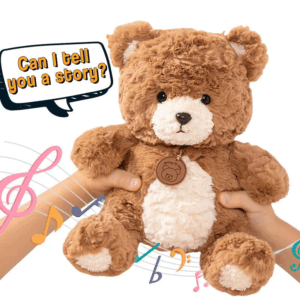Parents and grandparents need to know that not all toys on the shelves this holiday season are safe for kids. This year, newer tech companies are marketing risky AI-powered toys to children as young as 3, and giants like Meta are pushing new products with major safety issues onto teens.
It’s supposed to be the most wonderful time of the year, but on top of all the other holiday stress, parents shouldn’t have to worry about toys that spy on kids, interfere with their brain development, and even expose them to sexual predators.
We did some digging and found a few tech toys you’ll definitely want to know more about before they show up on your kids’ wishlists this holiday season. Here are five of 2025’s hottest tech toys that may have risks parents should know about:
Grok: AI-powered, interrupting rocket

Marketed for kids ages 3+, Grok is an AI chatbot wrapped in an adorable soft rocketship exterior. Early testers have warned that Grok butts into kids’ conversations even when asked to stop, and parents have to take several steps to stop kids’ private conversations from being fed back into the AI model.
ChattyBear: Teddy-wrapped listening device

What could be sweeter than a child talking to their teddy? Definitely not that teddy making them think AI is their trusty new best friend. This “ChatGPT powered” toy is being marketed for kids ages 3+, but development experts warn that AI toys can confuse kids’ developing brains and blur the line between canned responses and real human connection.
Robot J: Selling your young child’s location

Many parents love an educational STEM toy, but the company that makes this cool-looking robot (marketed for kids ages 7+) is in trouble with the Federal Trade Commission (FTC) for selling kids’ sensitive data – including their exact location while playing with the toy – to a Chinese company without parental consent.
MetaQuest 3S: Unsafe content for teens

Meta has a long track record of failing to keep kids safe on its products, and its latest VR headset is no exception. When Meta employees raised concerns that sexual predators were finding and abusing kids via MetaQuest, the company told them to stop their research. They also present a physical safety risk, as the boundary system has led to people hurting themselves running into furniture and walls.
Oakley Meta Vanguard: Privacy nightmare for teens

Yes, two separate Meta products made this list. These glasses are a privacy nightmare, as they can be used to send out a video with your location and your kid’s health metrics – in seconds. The supposedly visible camera is in a new unexpected spot which means kids can film each other easily without consent.
Be aware before you shop, so you can find fun gifts that put a smile on kids’ faces without putting their health and safety at risk!







